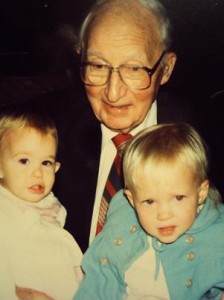Nate and I married when he was a second year law student at the University of Illinois and I was a teacher in a small town. Without money, we feathered our first nest in Early Hand-Me-Down, delighted with reject-carpeting and a used couch. Sticking Contact paper onto cabinets, walls and canisters (coffee cans) made our place a beautiful backdrop for young love.
I remember the first couple-trip we made to the grocery store to buy supplies. Our 23” long receipt is still glued into my engagement scrapbook, a happy reminder of a delightful date-night (despite the extravagant $43.68 bottom line).
While we were at the grocery store, Nate asked if we could buy some spices. Since he didn’t cook, I wasn’t sure why, but we bought the minimum: salt, pepper, cinnamon… and nutmeg. We painted the one-bedroom apartment white, and I moved in. (Nate had to wait 3 months, till after our November wedding.)
Like every other young couple, we had love-names for each other. Some will remain a secret, but the one Nate used most was “Meg”. It was unique to him, and both of us used it on love notes and cards.
A month before we were married, I opened one of our two kitchen cabinets to get the cinnamon for toast and found a tiny love note attached to our lone spice can. Nate had taken a strip of masking tape, covered the “nut” in “nutmeg” and written “Nate’s” instead, i.e. “Nate’s Meg.” I loved it so much I’ve taken care of it for 42 years, and tonight the rusted can is sitting on my desk.
We weren’t unique in having special names for each other. Some newlyweds even have a language all their own, a vocabulary just for them. We weren’t any different, using tender words and inside jokes to make the most of every minute together.
Decades passed, and many of the pet names we had for each other disappeared, but as the years went by, we learned how to communicate better and better. Long-married wives and husbands figure out what works by finally surrendering what doesn’t. And if couples make it to a 40th or 50th anniversary, they know how to effectively talk to each other.
Someone else who communicates perfectly is God. He not only understands (and speaks) every language on the planet, he “gets” the slang and couple-vocab, too. Better still, he comprehends thought-language, yearnings we might have trouble putting into words.
This is good news for widows, who often agonize so deeply that a whimper or a sob is all they can “say”. Even then, God hears accurately, knowing their names and even their nicknames. As the old hymn says, Jesus is the lover of our souls. He may even have some nicknames of his own for us.
The nickname “Meg” stuck on greeting cards and notes until the day Nate died. Although I eventually bought a new tin of nutmeg, Meg’s Nate can never be replaced.
“Undoubtedly there are all sorts of languages in the world, yet none of them is without meaning.” (1 Corinthians 14:10)






